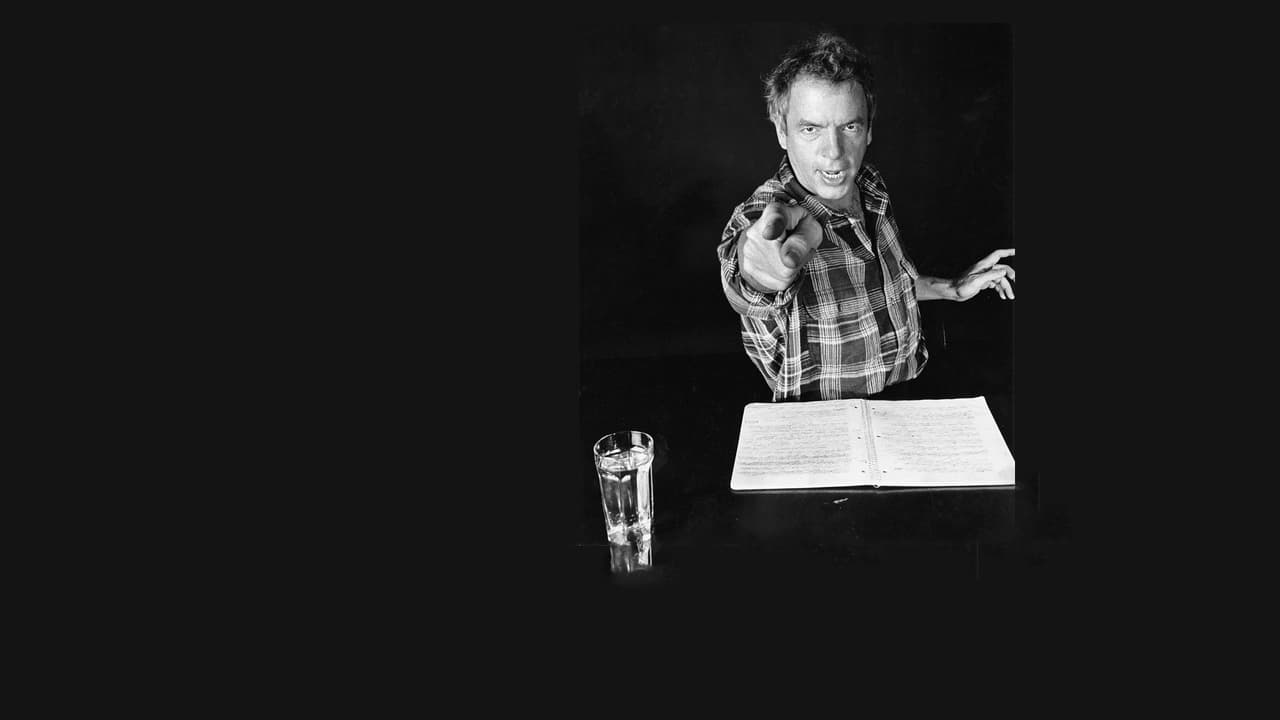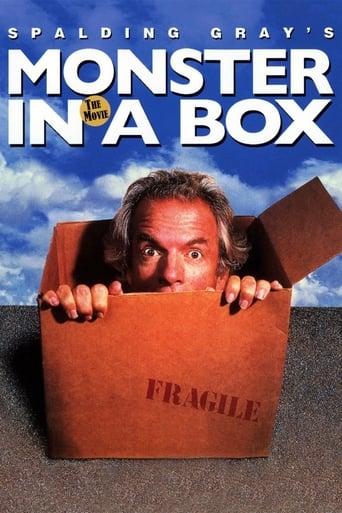

His voice projects every emotion imaginable in a matter of seconds...fear, confusion, sarcasm, irony, sadness, hope, happiness, etc., etc. Spalding Gray is a different kind of performer, a man whose monologues have continued to enthrall and inspire me ever since I first came across them. In "Monster in a Box", Gray recounts the years he spent writing a massive nearly 2,000 page semi autobiographical novel after his mother's suicide. Constantly being sidetracked by his own, absurd misadventures, Gray's life becomes a whirlwind of comic mischief and insightful self reflection. This piece allows the viewer to get inside the head of one of the performing arts' most underrated geniuses. Gray thankfully left his mark on the world before unfortunately deciding to have his own experience with suicide, one that be rid America of one of its greatest, funniest, and most unique talents. "Monster in a Box" is among his very best work as it combines all of the elements that made his work so fantastic and entertaining, particularly his humor and heart. Often outwardly wacky and quirkily comical, this film also contains moments of subtle poignancy. Whether this is truly a tragedy or a comedy by nature is up to the audience to decide. From my perspective, it further proves my ongoing theory that life is neither tragedy nor comedy, but rather a whirlwind of those two emotions; two emotions that aren't as clearly defined as we seem to think they are, two emotions far more similar than they appear.
... View MoreI really enjoy watching Spalding Gray's monologue films. The dry wit and humor, the self-deprecating approach to his insecurities and even those things that he felt pretty strongly about.I was watching his "Monster in a Box" (1992) film this morning (July 13, 2007) and, again, enjoying his recollections about his professional and personal life since he made the previous hit, "Swimming to Cambodia," (1987).And then it hit me...Spalding Gray is dead. I'm watching a film record of a man who supposedly committed suicide by jumping off the Staten Island Ferry into the East River sometime in January, 2004.His body wasn't found for nearly two months (March 9, 2004) and, by that time, the only thing that they believed they could recognize of Spalding Gray were the pants still clinging to the body.I will miss Spalding Gray very much and I am appreciative of the knowledge that he will still visit me every now and then when I turn on the television and happily discover one of his old films is being broadcast. But here's the point of this comment here in IMDb: Watching "Monster in a Box" reveals a high degree of potential insight into what is to become of Spalding Gray seventeen years into the future. All you have to do is listen... and think, "This man will commit suicide seventeen years from when he spoke these words." Think about this, what he said in Monster in a Box"... He is talking about the Christmas holiday season approaching. The only way he knew it was coming was because he had heard something about it on the radio. And for some reason or another (I didn't catch this part) he wanted to participate in a suicide telephone helpline, where he might help people who had become despondent and suicidal during the holidays.In order to join the suicide hotline "team," Spalding had to undergo a written test and then be interviewed by team leaders who were to determine his suitability to the task of stopping others from killing themselves.He "failed" the interview. One member of the interview team told him that it would be a good idea if he (Spalding) sought psychological counseling. This confession got a good laugh from the audience... but I knew something they didn't - and I thought about it: Perhaps helping others to stop from killing themselves might have been the best form of counseling Spalding Gray could ever have had. I'm not sure.Despite the fact that Spalding Gray had been habitually despondent ever since an auto accident in Ireland in 2001 had left him suffering from severe nerve damage, he had always struck me as being a tortured soul on the edge of self-destruction. His mother had committed suicide (he comments in the film about his own mother's severe despondency and how, on one occasion near the end, she had asked his advice on how she could best end her own life). It makes you wonder if suicide could somehow be genetic.Anyway, I thought that I would share this thought with you and - along with me - watch "Monster in a Box" again sometime in the future, and pay particular attention to the hidden asides and innuendoes of a suicide yet to come. If you note something of interest, maybe you'll share it with me... You can comment on it in the IMDb blog or chat room or whatever they call it at the bottom of the IMDb "Monster in a Box" web page. I'll start a "thread" in there called "Staten Island Ferry." Come and add your comment.
... View MoreIt isn't a movie but a monologue performance on film and a really good monologuist performance by Spaulding Gray. Anecdotes embellished for storytelling are patterned to fit in with flashbacks to the "Impossible Vacation" that sits atop the desk. Gray theatrically converses with the audience and other viewers of the performance, at times with the minimalist-synthesized score by Laurie Anderson to accentuate the mood. You will feel both the attempt for Gray to come full circle and the subtle depression Gray exudes through his retrospections well into the performance. Anyone who has lost someone close to mental illness or has lived a life like that of Spaulding Gray will empathize as they watch this series of strange adventures into writing, acting, relationships, society, and the simile of personal solitude to self-realization whenever experiences unexpected encounters through one's own ambling.
... View MoreJerry Seinfeld has nothing on Spalding Gray. This is one of the more unusual 90 minutes you will spend, as Gray discusses the trials and tribulations of writing a screenplay.The entire movies shows Gray sitting at a desk, looking straight ahead. He deals with personal and professional relationships, religious and ethical beliefs; and yet somehow manages to hold your attention.Not for everyone, but you can actually watch it in parts, or even flick back and forth if it's on TV. The snippets of Gray's life sometimes seem real, sometimes unbelievable, but always give a feeling of truly looking into another person's soul.
... View More